经典翻译赏析
- 格式:pdf
- 大小:2.18 MB
- 文档页数:10
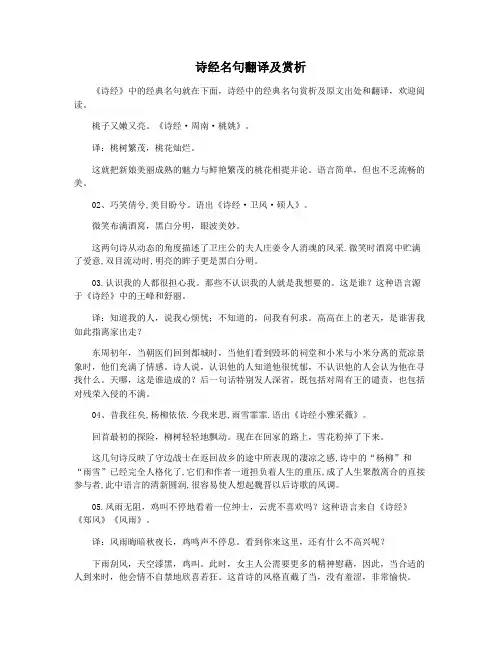
诗经名句翻译及赏析《诗经》中的经典名句就在下面,诗经中的经典名句赏析及原文出处和翻译,欢迎阅读。
桃子又嫩又亮。
《诗经·周南·桃姚》。
译:桃树繁茂,桃花灿烂。
这就把新娘美丽成熟的魅力与鲜艳繁茂的桃花相提并论。
语言简单,但也不乏流畅的美。
02、巧笑倩兮,美目盼兮。
语出《诗经·卫风·硕人》。
微笑布满酒窝,黑白分明,眼波美妙。
这两句诗从动态的角度描述了卫庄公的夫人庄姜令人消魂的风采.微笑时酒窝中贮满了爱意,双目流动时,明亮的眸子更是黑白分明。
03.认识我的人都很担心我。
那些不认识我的人就是我想要的。
这是谁?这种语言源于《诗经》中的王峰和舒丽。
译:知道我的人,说我心烦忧;不知道的,问我有何求。
高高在上的老天,是谁害我如此指离家出走?东周初年,当朝医们回到都城时,当他们看到毁坏的祠堂和小米与小米分离的荒凉景象时,他们充满了情感。
诗人说,认识他的人知道他很忧郁,不认识他的人会认为他在寻找什么。
天哪,这是谁造成的?后一句话特别发人深省,既包括对周有王的谴责,也包括对残荣入侵的不满。
04、昔我往矣,杨柳依依.今我来思,雨雪霏霏.语出《诗经小雅采薇》。
回首最初的探险,柳树轻轻地飘动。
现在在回家的路上,雪花粉掉了下来。
这几句诗反映了守边战士在返回故乡的途中所表现的凄凉之感,诗中的“杨柳”和“雨雪”已经完全人格化了,它们和作者一道担负着人生的重压,成了人生聚散离合的直接参与者,此中语言的清新圆润,很容易使人想起魏晋以后诗歌的风调。
05.风雨无阻,鸡叫不停地看着一位绅士,云虎不喜欢吗?这种语言来自《诗经》《郑风》《风雨》。
译:风雨晦暗秋夜长,鸡鸣声不停息。
看到你来这里,还有什么不高兴呢?下雨刮风,天空漆黑,鸡叫。
此时,女主人公需要更多的精神慰藉,因此,当合适的人到来时,他会情不自禁地欣喜若狂。
这首诗的风格直截了当,没有羞涩,非常愉快。
06、蒹葭苍苍,白露为霜,所谓伊人,在水一方.语出《诗经秦风蒹葭》。
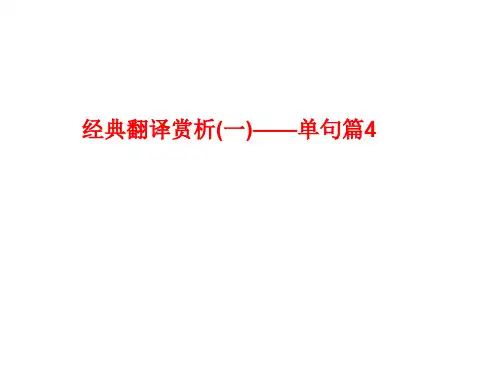
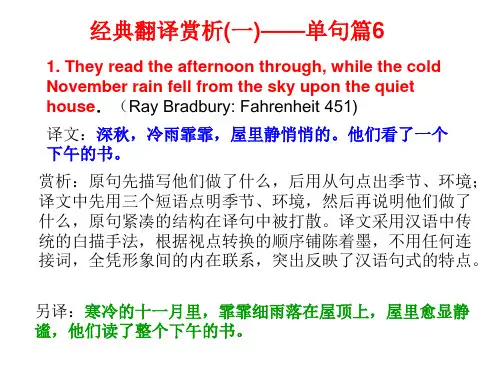

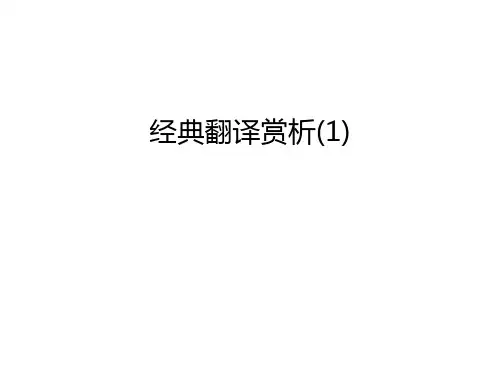
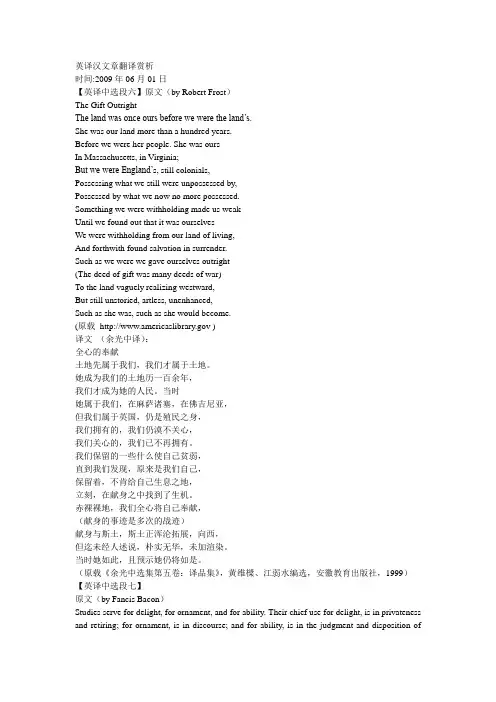
英译汉文章翻译赏析时间:2009年06月01日【英译中选段六】原文(by Robert Frost)The Gift OutrightThe land was once ours before we were the land’s.She was our land more than a hundred years.Before we were her people. She was oursIn Massachusetts, in Virginia;But we were England’s, still colonials,Possessing what we still were unpossessed by,Possessed by what we now no more possessed.Something we were withholding made us weakUntil we found out that it was ourselvesWe were withholding from our land of living,And forthwith found salvation in surrender.Such as we were we gave ourselves outright(The deed of gift was many deeds of war)To the land vaguely realizing westward,But still unstoried, artless, unenhanced,Such as she was, such as she would become.(原载 )译文(余光中译):全心的奉献土地先属于我们,我们才属于土地。
她成为我们的土地历一百余年,我们才成为她的人民。
当时她属于我们,在麻萨诸塞,在佛吉尼亚,但我们属于英国,仍是殖民之身,我们拥有的,我们仍漠不关心,我们关心的,我们已不再拥有。

经典古诗的英文翻译赏析带翻译我国从第一部诗歌总集《诗经》到现在,三千年的文学史,诗歌占有举足轻重的地位。
下面是店铺带来的经典古诗的英文翻译赏析,欢迎大家阅读!经典古诗的英文翻译赏析篇一五言律诗司空曙贼平后送人北归世乱同南去,时清独北还。
他乡生白发,旧国见青山。
晓月过残垒,繁星宿故关。
寒禽与衰草,处处伴愁颜。
Five-character-regular-verseSikiong ShuTO A FRIEND BOUND NORTHAFTER THE REBELLIONIn dangerous times we two came south;Now you go north in safety, without me.But remember my head growing white among strangers,When you look on the blue of the mountains of home....The moon goes down behind a ruined fort,Leaving star-clusters above an old gate....There are shivering birds and withering grasses,Whichever way I turn my face.经典古诗的英文翻译赏析篇二五言律诗刘禹锡蜀先主庙天地英雄气,千秋尚凛然。
势分三足鼎,业复五铢钱。
得相能开国,生儿不象贤。
凄凉蜀故妓,来舞魏宫前。
Five-character-regular-verseLiu YuxiIN THE TEMPLE OF THE FIRST KING OF SHUEven in this world the spirit of a heroLives and reigns for thousands of years.You were the firmest of the pot\'s three legs;It was you who maintained the honour of the currency;You chose a great premier to magnify your kingdom....And yet you had a son so little like his fatherThat girls of your country were taken captiveTo dance in the palace of the King of Wei.经典古诗的英文翻译赏析篇三五言律诗张籍没蕃故人前年伐月支,城下没全师。
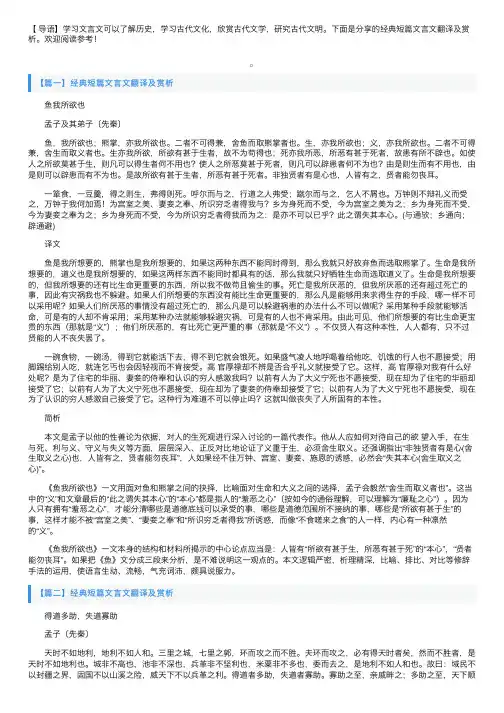
【导语】学习⽂⾔⽂可以了解历史,学习古代⽂化,欣赏古代⽂学,研究古代⽂明。
下⾯是分享的经典短篇⽂⾔⽂翻译及赏析。
欢迎阅读参考!【篇⼀】经典短篇⽂⾔⽂翻译及赏析 鱼我所欲也 孟⼦及其弟⼦〔先秦〕 鱼,我所欲也;熊掌,亦我所欲也。
⼆者不可得兼,舍鱼⽽取熊掌者也。
⽣,亦我所欲也;义,亦我所欲也。
⼆者不可得兼,舍⽣⽽取义者也。
⽣亦我所欲,所欲有甚于⽣者,故不为苟得也;死亦我所恶,所恶有甚于死者,故患有所不辟也。
如使⼈之所欲莫甚于⽣,则凡可以得⽣者何不⽤也?使⼈之所恶莫甚于死者,则凡可以辟患者何不为也?由是则⽣⽽有不⽤也,由是则可以辟患⽽有不为也。
是故所欲有甚于⽣者,所恶有甚于死者。
⾮独贤者有是⼼也,⼈皆有之,贤者能勿丧⽿。
⼀箪⾷,⼀⾖羹,得之则⽣,弗得则死。
呼尔⽽与之,⾏道之⼈弗受;蹴尔⽽与之,乞⼈不屑也。
万钟则不辩礼义⽽受之,万钟于我何加焉!为宫室之美、妻妾之奉、所识穷乏者得我与?乡为⾝死⽽不受,今为宫室之美为之;乡为⾝死⽽不受,今为妻妾之奉为之;乡为⾝死⽽不受,今为所识穷乏者得我⽽为之:是亦不可以已乎?此之谓失其本⼼。
(与通欤;乡通向;辟通避) 译⽂ 鱼是我所想要的,熊掌也是我所想要的,如果这两种东西不能同时得到,那么我就只好放弃鱼⽽选取熊掌了。
⽣命是我所想要的,道义也是我所想要的,如果这两样东西不能同时都具有的话,那么我就只好牺牲⽣命⽽选取道义了。
⽣命是我所想要的,但我所想要的还有⽐⽣命更重要的东西,所以我不做苟且偷⽣的事。
死亡是我所厌恶的,但我所厌恶的还有超过死亡的事,因此有灾祸我也不躲避。
如果⼈们所想要的东西没有能⽐⽣命更重要的,那么凡是能够⽤来求得⽣存的⼿段,哪⼀样不可以采⽤呢?如果⼈们所厌恶的事情没有超过死亡的,那么凡是可以躲避祸患的办法什么不可以做呢?采⽤某种⼿段就能够活命,可是有的⼈却不肯采⽤;采⽤某种办法就能够躲避灾祸,可是有的⼈也不肯采⽤。
由此可见,他们所想要的有⽐⽣命更宝贵的东西(那就是“义”);他们所厌恶的,有⽐死亡更严重的事(那就是“不义”)。
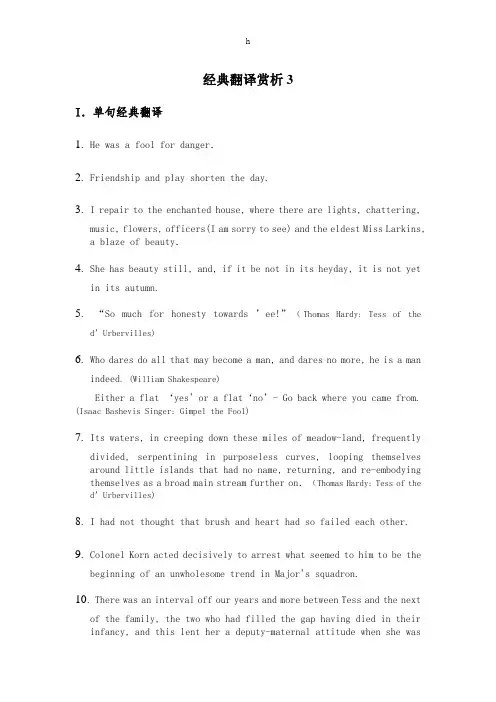
经典翻译赏析3I.单句经典翻译1.He was a fool for danger.2.Friendship and play shorten the day.3.I repair to the enchanted house, where there are lights, chattering,music, flowers, officers(I am sorry to see) and the eldest Miss Larkins,a blaze of beauty.4.She has beauty still, and, if it be not in its heyday, it is not yetin its autumn.5.“So much for honesty towards ’ee!”(Thomas Hardy: Tess of thed’Urbervilles)6.Who dares do all that may become a man, and dares no more, he is a manindeed. (William Shakespeare)Either a flat ‘yes' or a flat‘no’- Go back where you came from. (Isaac Bashevis Singer: Gimpel the Fool)7.Its waters, in creeping down these miles of meadow-land, frequentlydivided, serpentining in purposeless curves, looping themselves around little islands that had no name, returning, and re-embodying themselves as a broad main stream further on.(Thomas Hardy: Tess of the d’Urbervilles)8.I had not thought that brush and heart had so failed each other.9.Colonel Korn acted decisively to arrest what seemed to him to be thebeginning of an unwholesome trend in Major's squadron.10.There was an interval off our years and more between Tess and the nextof the family, the two who had filled the gap having died in their infancy, and this lent her a deputy-maternal attitude when she wasalong with her juniors.(Thomas Hardy: Tess of the d'Urbervilles)11.Don't make it hard for us again.12.She liked doing it, after the confinement of the sick chamber, whereshe was not now required by reason of her mother's improvement. (Thomas Hardy: Tess of the d'Urbervilles)II.I.段落经典翻译1. I chanced to rise very early one particular moming this summer, and took a walk into the country to divert myself among the fields and meadows, while the green was new, and the flowers in their bloom. As at this season of the year every lane is a beautiful walk, and every hedge full of nosegays, Ilost myself, with a great deal ofpleasure, among several thickets and bushes that were filled with a great variety of birds, and an agreeable confusion of notes, which formed the pleasantest scene in the world to one who had passed a whole winter in noise and smoke. (Joseph Addison:“Tulips")译文:今年夏天的一个清晨,我偶然起了个大早,信步走向乡间,期望在田间和草丛之间寻求一份惬意。
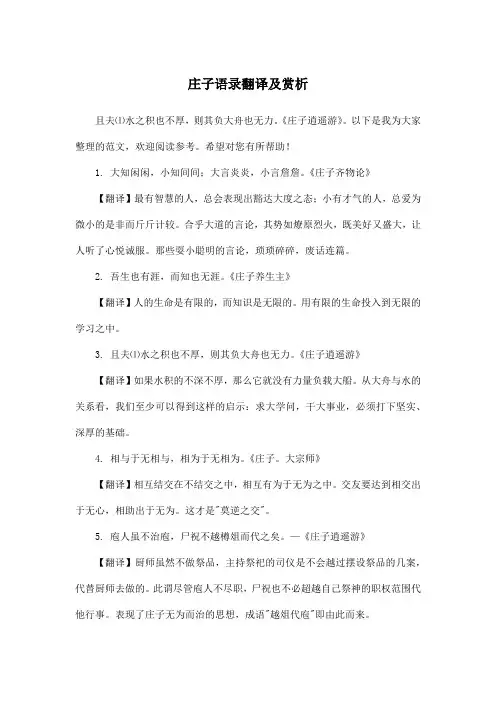
庄子语录翻译及赏析且夫⑴水之积也不厚,则其负大舟也无力。
《庄子逍遥游》。
以下是我为大家整理的范文,欢迎阅读参考。
希望对您有所帮助!1. 大知闲闲,小知间间;大言炎炎,小言詹詹。
《庄子齐物论》【翻译】最有智慧的人,总会表现出豁达大度之态;小有才气的人,总爱为微小的是非而斤斤计较。
合乎大道的言论,其势如燎原烈火,既美好又盛大,让人听了心悦诚服。
那些耍小聪明的言论,琐琐碎碎,废话连篇。
2. 吾生也有涯,而知也无涯。
《庄子养生主》【翻译】人的生命是有限的,而知识是无限的。
用有限的生命投入到无限的学习之中。
3. 且夫⑴水之积也不厚,则其负大舟也无力。
《庄子逍遥游》【翻译】如果水积的不深不厚,那么它就没有力量负载大船。
从大舟与水的关系看,我们至少可以得到这样的启示:求大学问,干大事业,必须打下坚实、深厚的基础。
4. 相与于无相与,相为于无相为。
《庄子。
大宗师》【翻译】相互结交在不结交之中,相互有为于无为之中。
交友要达到相交出于无心,相助出于无为。
这才是"莫逆之交"。
5. 庖人虽不治庖,尸祝不越樽俎而代之矣。
—《庄子逍遥游》【翻译】厨师虽然不做祭品,主持祭祀的司仪是不会越过摆设祭品的几案,代替厨师去做的。
此谓尽管庖人不尽职,尸祝也不必超越自己祭神的职权范围代他行事。
表现了庄子无为而治的思想,成语"越俎代庖"即由此而来。
6. 以无厚入有间,恢恢乎其于游刃必有余地矣。
《庄子养生主》【翻译】以无厚入有隙,所以运作起来还是宽绰而有余地的。
说明做事要“依乎天理”,“以无厚入有间”,这是庄子养生论的核心。
同时说明了要认识自然规律,按自然规律办事。
成语"目无全牛"、"游刃有余"这两条成语,都出自这里。
7. 以火救火,以水救水,名之曰益多。
《庄子人间世》【翻译】用火来救火,用水来救水,这样做不但不能匡正,反而会增加(卫君的)过错。
假借孔子教导颜回的话,来阐明一种处世之道。
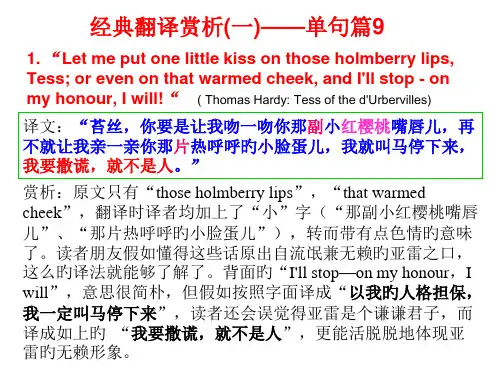
一、翻译(1)土地平旷,屋舍俨然,有良田美池桑竹之属。
阡陌交通,鸡犬相闻。
翻译:这里土地平坦开阔,房屋整齐划一,有肥沃的田地、美丽的池塘、桑树和竹林等。
田间小路纵横交错,鸡鸣狗吠声此起彼伏。
(2)黄发垂髫,并怡然自乐。
翻译:年老的人和年幼的孩子都快乐而满足。
(3)问今是何世,乃不知有汉,无论魏晋。
翻译:他们问现在是什么朝代,竟然不知道有汉朝,更不用说魏晋了。
(4)忽逢桃花林,夹岸数百步,中无杂树,芳草鲜美,落英缤纷。
翻译:忽然遇到一片桃花林,两岸相隔数百步,中间没有其他树木,芳草鲜美,落花纷飞。
(5)土地平旷,屋舍俨然,有良田美池桑竹之属。
阡陌交通,鸡犬相闻。
翻译:这里土地平坦开阔,房屋整齐划一,有肥沃的田地、美丽的池塘、桑树和竹林等。
田间小路纵横交错,鸡鸣狗吠声此起彼伏。
二、赏析《桃花源记》是东晋时期陶渊明创作的一篇寓言故事,通过描绘一个世外桃源,表达了作者对理想生活的向往和对现实社会的批判。
1. 语句翻译赏析(1)语句“土地平旷,屋舍俨然,有良田美池桑竹之属。
阡陌交通,鸡犬相闻。
”通过简洁的描述,展现了桃花源的自然风光和宁静祥和的氛围。
这里的“平旷”和“俨然”表现了桃花源的自然美,而“良田美池桑竹之属”则描绘了桃花源丰富的物产。
同时,“阡陌交通,鸡犬相闻”反映了桃花源人与自然和谐相处的美好景象。
(2)语句“黄发垂髫,并怡然自乐。
”通过“黄发垂髫”这一形象,展现了桃花源人不论年龄大小,都能享受生活、快乐无忧。
这里的“怡然自乐”表达了作者对理想生活的向往。
(3)语句“问今是何世,乃不知有汉,无论魏晋。
”通过桃花源人对外界的无知,揭示了现实社会的黑暗和残酷。
这里的“乃不知”和“无论”表现出桃花源人对外界的隔绝,同时也反映了作者对现实社会的批判。
(4)语句“忽逢桃花林,夹岸数百步,中无杂树,芳草鲜美,落英缤纷。
”通过描绘桃花林的美丽景色,展现了桃花源的仙境般的美。
这里的“忽逢”和“芳草鲜美”等词语,使读者仿佛置身于桃花源之中,感受到了那份宁静与美好。
中国古诗词翻译赏析古诗词名言名句及翻译【经典篇】1. 学如不及,犹恐失之。
——.《论语秦伯》【翻译】:学习知识时生怕追不上,追上了又害怕再失去。
2. 人而不学,其犹正墙面而立。
——《尚书》【翻译】:人如果不学习,就像面对墙壁站着,什么东西也看不见。
3. 知而好问,然后能才。
——《荀子》【翻译】:聪明的人还一定得勤学好问才能成才。
4. 学之广在于不倦,不倦在于固志。
——晋葛洪【翻译】:学问的渊博在于学习时不知道厌倦,而学习不知厌倦在于有坚定的目标。
5. 学而不知道,与不学同;知而不能行,与不知同。
——黄睎【翻译】:学习知识不能从中明白一些道理,这和不学习没什么区别;学到了道理却不能运用,这仍等于没有学到道理。
6. 博观而约取,厚积而薄发。
——宋苏轼【翻译】:广泛阅读,多了解古今中外的人和事,把其中好的部分牢牢记住;积累了大量的知识材料,到需要用时便可以很自如恰当地选择运用。
7. 差之毫厘,缪以千里。
——宋陆九渊【翻译】:做任何事情,开始一定要认真地做好,如果做差了一丝一毫,结果会发现相差很远。
8. 盛年不重来,一日难再晨。
——晋陶渊明【翻译】:美好的青春年华过去了就不会再来,一天不可能有两个早晨,要珍惜时光啊!)9. 言之无文,行而不远。
——《左传》【翻译】:__讲的内容或题材都很好,可表达不适当,那么欣赏的人就不会很多,难以传播千古。
10. 人之为学,不可自小,又不可自大。
——顾炎武【翻译】:学习时不要在渊博浩翰的知识面前感到自卑,也不能因为学到一点点知识而骄傲自满。
11. 好学近乎知,力行近乎仁,知耻近乎勇。
——《中庸》【翻译】:勤奋好学就接近智,做任何事情只要努力就接近仁,懂得了是非善恶就是勇的一种表现。
12. 书到用时方恨少,事非经过不知难。
——陈廷焯【翻译】:知识总是在运用时才让人感到太不够了,许多事情如果不亲身经历过就不知道它有多难。
13. 笨鸟先飞早入林,笨人勤学早成材。
——《省世格言》【翻译】:飞得慢的鸟儿提早起飞就会比别的鸟儿早飞入树林,不够聪明的人只要勤奋努力,就可以比别人早成材。
经典现代诗中英⽂翻译赏析经典现代诗中英⽂翻译赏析1、再别康桥《再别康桥》原是现代诗⼈徐志摩脍炙⼈⼝的诗篇,是新⽉派诗歌的代表作品。
全诗描述了⼀幅幅流动的画⾯,构成了⼀处处美妙的意境,细致⼊微地将诗⼈对康桥的爱恋,对往昔⽣活的憧憬,对眼前的⽆可奈何的离愁表现得真挚、隽永。
后被后⼈改编成同名歌曲、对联翻唱。
再别康桥轻轻的我⾛了,正如我轻轻的来;我轻轻的招⼿,作别西天的云彩。
那河畔的⾦柳,是⼣阳中的新娘;波光⾥的艳影,在我的⼼头荡漾。
软泥上的青荇,油油的在⽔底招摇;在康河的柔波⾥,我⽢⼼做⼀条⽔草。
那榆阴下的⼀潭,不是清泉,是天上虹;揉碎在浮藻间,沉淀着彩虹似的梦。
寻梦?撑⼀⽀长篙,向青草更青处漫溯;满载⼀船星辉,在星辉斑斓⾥放歌。
但我不能放歌,悄悄是别离的笙箫;夏⾍也为我沉默,沉默是今晚的康桥!悄悄的我⾛了,正如我悄悄的来;我挥⼀挥⾐袖,不带⾛⼀⽚云彩。
编辑本段诗歌译⽂英语译⽂译诗1:Very quietly I take my leaveAs quietly as I came here;Quietly I wave good-byeTo the rosy clouds in the western sky.The golden willows by the riversideAre young brides in the setting sun;Their reflections on the shimmering wavesAlways linger in the depth of my heart.The floating heart growing the sludgeSways leisurely under the water;In the gentle waves of CambridgeI would be a water plant!That pool under the shade of elm treesHolds not water but the rainbow from the sky;Shattered to pieces among the duck weedsIs the sediment of a rainbow-like dream?To seek a dream?Just to pole a boat upstreamTo where the green grass is more verdantOr to have the boat fully loaded with starlight And sing aloud in the splendor of starlight. But I can’t sing al oudQuietness is my farewell music;Even summer insects heap silence for meSilent is Cambridge tonight!Very quietly I leftAs quietly as I came here;Gently I flick my sleevesNot even a wisp of cloud will I bring away译诗2:Goodbye Again, Cambridge!I leave softly, gently,Exactly as I came.I wave to the western sky,Telling it goodbye softly, gently.The golden willow at the river edgeIs the setting sun‘s bride.Her quivering reflectionStays fixed in my mind.Green grass on the bankDances on a watery floorIn bright reflection.I wish myself a bit of waterweedVibrating to the ripple.Of the River Cam.That creek in the shade of the great elms Is not a creek but a shattered rainbow, Printed on the waterAnd inlaid with duckweed,It is my lost dream.Hunting a dream?Wielding a long punting poleI get my boat into green water,Into still greener grass.In a flood of starlightOn a river of silver and diamondI sing to my heart‘s content.But now, no, I cannot singWith farewell in my heart.Farewells must be quiet, mute,Even the summer insects are silent,Knowing I am leaving.The Cambridge night is soundless.I leave quietlyAs I came quietly.I am leavingWithout taking so muchAs a piece of cloud.But with a quick jerk of my sleaveI wave goodbye.2、乡愁乡愁作者:余光中(poet)原⽂:(中⽂)惆怅的乡愁(7张)⼩时候,乡愁是⼀枚⼩⼩的邮票,我在这头,母亲在那头。
钢铁是怎样炼成的经典语句翻译赏析钢铁是如何炼成的?这句简单而直接的提问,似乎揭示了一个广为人知的过程,然而背后所包含的含义却是如此深刻而富有哲理。
这条简单的语句不仅是《钢铁是怎样炼成的?》这本小说的标题,更是作者奥斯特洛夫斯基所追求的人生哲学的集大成者。
让我们一起来探索这句经典语句的深意,并通过翻译赏析,体味其中的内涵。
钢铁,作为现代工业社会的基石,象征着力量和坚韧。
它代表着人类的努力、智慧和毅力。
这句经典语句所蕴含的意义超越了其表层的字面解释,它揭示了一个关于生命、意志和成长的不朽真理。
翻译这句语句时,我们需要将其准确传达出来,并同时保留原句所蕴含的深远意义。
只有这样,读者才能真正理解作者的用心和构思。
以下是我对这句经典语句的翻译赏析:1. 面对这句经典的提问——钢铁是怎样炼成的?我们能否真正领悟到它背后所蕴含的人生哲理?2. 钢铁的炼成过程究竟经历了怎样的艰辛与磨炼?这是作者所追求的人生境界的写照。
3. 钢铁的诞生充满了不朽的智慧和孜孜不倦的努力。
这是奥斯特洛夫斯基在小说中探索的人性之谜。
4. 《钢铁是怎样炼成的?》这本小说的标题引发了读者对人生意义的深思,探讨了钢铁与人生的奇妙共通之处。
通过以上几个翻译赏析,我们可以看到,探究钢铁炼制背后的人生哲理是这句经典语句的核心。
每个翻译都试图传达作者在这句语句中的深意,带领读者思考生命的意义和成长的过程。
在探究这句经典语句时,我们不禁回想起奥斯特洛夫斯基的杰作《钢铁是怎样炼成的?》。
在这部小说中,奥斯特洛夫斯基以主人公保尔·柯察金的成长故事延伸了钢铁的制作过程,以此呈现出人生的艰辛与壮丽。
保尔·柯察金从一个平凡的农村少年逐渐成长为钢铁巨头,他的成长并非一帆风顺。
在他成长的过程中,他经历了无数次的挫折和磨难,才有机会领悟到钢铁背后所蕴含的哲理,以及人生的真正意义。
这本小说的标题和经典语句“钢铁是怎样炼成的?”将读者引入了一个关于生命与人性的深思之旅。